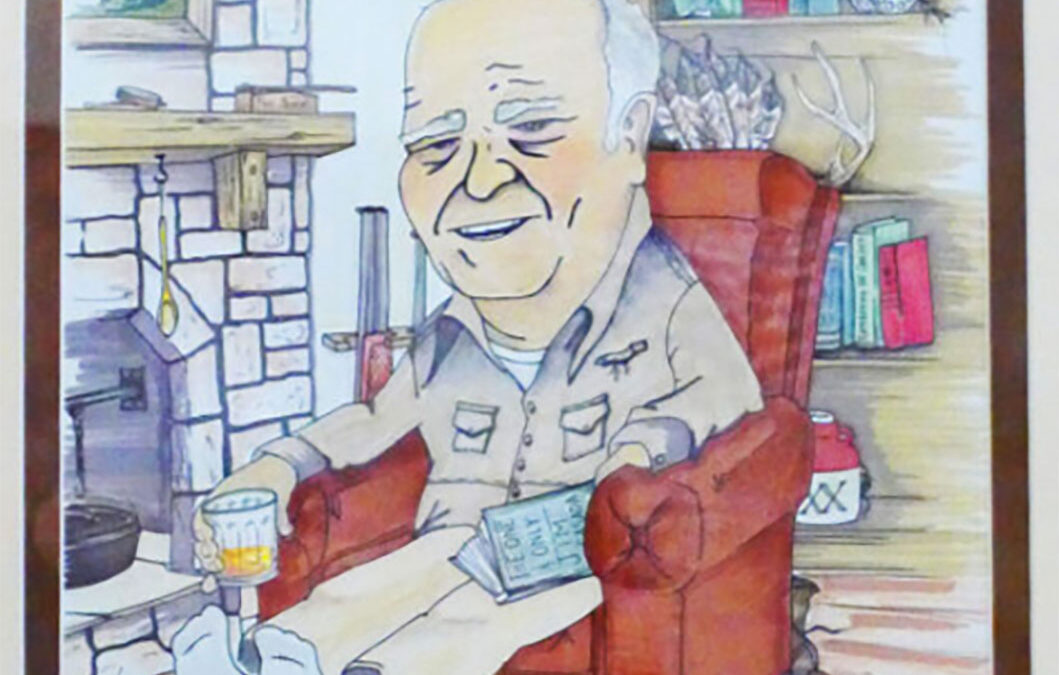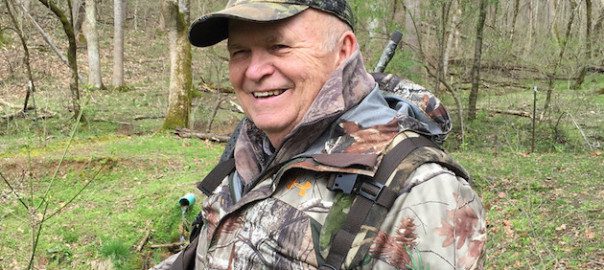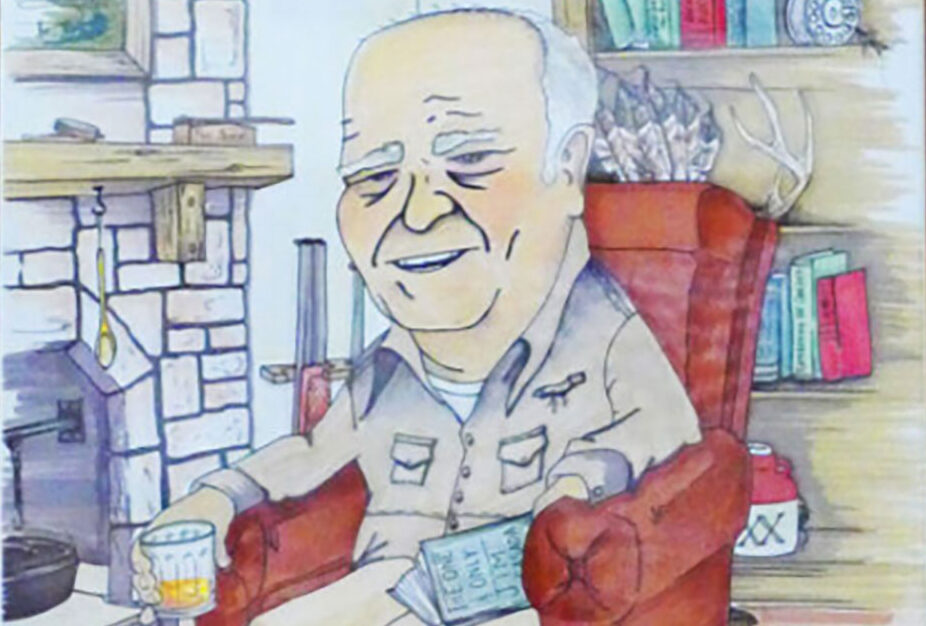MOLLYGRUBS GOES FOX HUNTING
In the days of Mollygrubs Messer’s youth, fox hunting in the British Isles was a sport for the upper classes and involved fine horses, attire such as hard hats, high and highly polished black boots, hunt masters wearing red jackets, and enough expectations associated with chase dress and etiquette of to leave the uninitiated hopelessly perplexed. Similar dictates of style and participant behavior held sway among the elite in American environs such as the countryside around Middleburg, Virginia and upstate New York. By way of sharp contrast though, there was no “riding to the hounds” in the adolescent world of Mollygrubs Messer. Instead, fox hunting involved listening to the hounds chase a fox rather than galloping pell-mell about the country chasing hounds while risking life and limb astride a horse. Yet a Stoney Lonesome fox hunt had every bit as much ritual, ceremony, and treasured tradition as posh hunt clubs where the average participant was a millionaire many times over.
A Stoney Lonesome fox hunt was a combination of many things. One of the most important was that the experience, which usually took place in early autumn when the land was blessed by Indian Summer days and nights chilly enough to make a fire a matter of comfort for anyone in an outdoor setting, offered local menfolks, especially those who were married, an excellent opportunity to escape their daily burdens. They were gaining temporary respite from the cares and worries of overbearing spouses who followed patterns of marital behavior similar to the overbearing actions of viragoes such as “Caring Karen” Messer.
The memorable incident at the Junior Conservation Banquet involving her son, Mollygrubs, had temporarily taken the winds out of her sails, but with the passage of only a few months she was once more showing abundant signs of the sort of troublesome meddling that worried both her long-suffering spouse and their perpetually ill-fated son. Accordingly, both welcomed the arrival of word that there were plans in the works for a big fox hunt come Saturday.
The senior male in the Messer family duly warned his son, who was to be allowed to participate in his first fox hunt, that there might be a good bit of indulgence in illicit products from local moonshiners and that he would hear language fit to cause a bawd in a lower class brothel to blush. In truth Mollygrubs, thanks to some decidedly questionably male adolescent tormentors who occasionally posed as companions, was far more familiar with such crudities than his sire would have wanted to know. Instead, the senior Messer male saw the fox hunt as a mixture of a rite of passage for his son and a grand opportunity to show off the abilities of a fox hound he had acquired a few months earlier.
The “hound,” never mind that its appearance suggested the least asked about its bloodlines the best, unquestionably had a fine voice that rang down hollows and bounced off ridges in a fashion certain to make any hound dog man proud. Mind you, up to this juncture that melodious voice had only sung its grand song while chasing house cats, tracking cottontails, or simply howling at the moon. In other words, its owner had no assurance whatever that his “fox hound” would indeed chase a fox. Still, hope and confidence were never in short supply in the Messer family. With a child like Mollygrubs that sort of outlook was in effect mandatory.
The dog’s owner, after listening to his most recent canine acquisition give voice a few times, had chosen to name it Bugle. It might be noted that the senior Messer also owned several rabbit beagles, a fice and a mountain cur for squirrel hunting, a pair of pointers, and a setter. In other words, he was an experienced, albeit not necessarily an astute or accomplished, hunting dog man. Maybe the name given the latest addition to his kennel was a mere matter of inspiration or perhaps Squire Messer was sufficiently well read to be familiar with Pulitzer Prize winning author MacKinlay Kantor’s splendid piece of literature, “The Voice of Bugle Ann.” More likely though, since the Messer clan wasn’t greatly given to intellectual pursuits such as serious reading, he had seen the movie based on Kantor’s piece that starred Lionel Barrymore and Maureen O’Sullivan.
Whatever the case, and never mind that Kantor’s gifted fictional canine had been a bitch, not a dog, the hound had a voice meriting the name. Caring Karen did care much for this voice of wonder, or for that matter any of the numerous hunting companions that had to be fed, howled at everything from fire sirens to Sunday church bells, and watered her prized roses every time one of them managed to escape its pen; however, this was one of the few areas where her spouse somehow summoned up sufficient gumption to withstand her troublesome, almost constant complaints and imprecations.
When the big night arrived, a premiere for both Mollygrubs and Bugle, conditions were ideal. The sky-filling, earth-lighting wonder of a full Hunter’s Moon was only two nights away, and the autumn air had a bracing chill sure to make a roaring fire most welcome. Moreover, the temperature provided perfect justification for a dram or two of local brew to ward off any hint of cold creeping into aging bones. Add the fact that it had rained the day before, making for ideal tracking conditions, and perfectly calm air so that the sound of hounds would carry a long way, and you had all the makings of a perfect fox hunt.
Even so, the senior Messer decided to add a bit of surprise and suspense to the evening. With that in mind he and Mollygrubs arrived at the pre-determined listening spot well ahead of the other hunters, and as the gloaming gave way to pitch black dark the young man followed parental instructions to tie Bugle to a tree some distance from the campfire site and stay with the hound until the pack struck a trail. At that point he was to release Bugle and quietly blend into the assemblage of hunters gathered around the fire.
All went as planned up to the point when the other dogs hit a hot trail quite close by. The chase was so frenetic, so intensely audible, that Mollygrubs became mindlessly excited. He rushed to join the other hunters around the campfire and forgot to turn Bugle loose. Soon his father was bragging about his new dog with words such as “listen to that Bugle play a tune,” “can’t that new dog of mine sing a pretty song,” and “that hound sure can make the woods ring.” Mollygrubs then belatedly realized the gravity of his woeful oversight and tried repeatedly to get his father’s attention. He even went so far as to tug at his sleeve, only to be brusquely told: “Hush now son, this is men’s talk and boys are to listen rather than be heard.”
Within moments of these fateful words being uttered Bugle, no longer able to stand the sound of companion canines enjoying the chase, howled from where he was restrained in nearby. While father and son both hastened to rectify matters, the damage had been done. To make matters even worse, once released the hapless Bugle, rather than madly scrambling to join the chase, slunk up to the group of hunters, tail half between his legs, and displayed no eagerness whatsoever to be anywhere else. Squire Messer had been , as one of his companions put it, bragging on “a ghost dog’s voice,” while another sarcastically suggested that serious consideration be given to renaming Bugle, with popular suggestions for new monikers including the likes of “Old Flute,” “Old Fireside,” and “Piccolo.”
On this occasion Mollygrubs at least had a companion in misery in the form of his father, but at hunt’s end, with dog and owner alike objects of ridicule and disgrace, it was Mollygrubs who was in the dog house. The gloriously planned duel debut of purported fox hound and his offspring had gone woefully awry, and Herr Messer, amidst his mortification and humiliation, somewhat unfairly placed all the blame on his son. Thus was another chapter added to the ongoing misadventures of young master Mollygrubs. Yet as we will discover in due time, it would be far from the last of his misfortunes with hunting dogs.
 This work, which is an updated and revised combination of two venison cookbooks Casada wrote with his late wife, Ann, runs to 264 pages of recipes and a detailed index along with an additional 14 pages of narrative material on subjects such as how to handle your deer at every step from shot to pot, health information, and more. There are 282 recipes for venison along with well over a 100 more for sauces, marinades, toppings, and the like. There are dozens of toppings for burgers and other preparations as well. Buy Now
This work, which is an updated and revised combination of two venison cookbooks Casada wrote with his late wife, Ann, runs to 264 pages of recipes and a detailed index along with an additional 14 pages of narrative material on subjects such as how to handle your deer at every step from shot to pot, health information, and more. There are 282 recipes for venison along with well over a 100 more for sauces, marinades, toppings, and the like. There are dozens of toppings for burgers and other preparations as well. Buy Now




